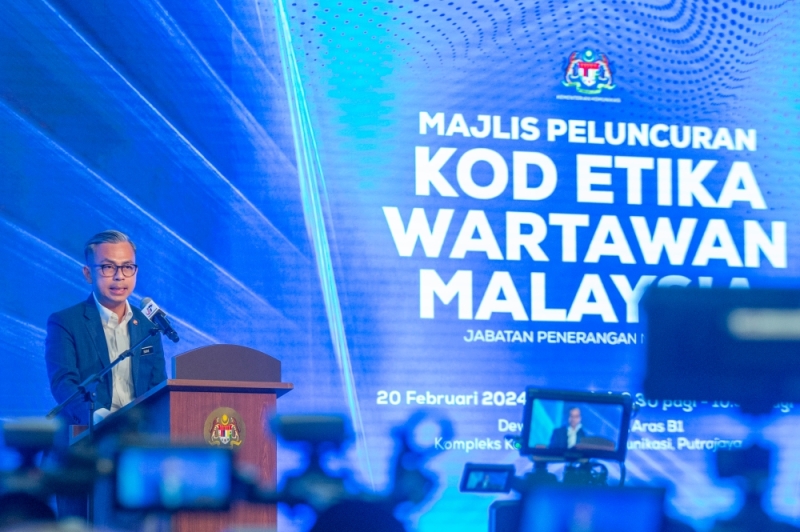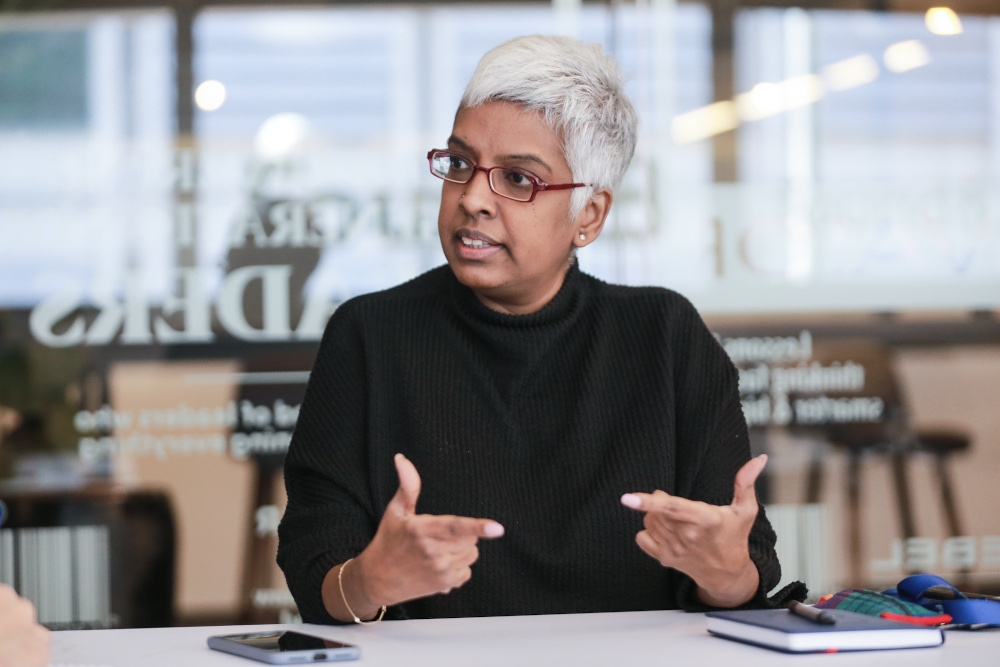
KUALA LUMPUR, Feb 28 — Advocates of free speech expressed concern over the government’s recently revamped Code of Ethics for journalists, citing poor writing, insufficient detail and lack of transparency in its formulation.
They argued that the eight principles lacked clear guidelines, making them vulnerable to interpretation and potentially restrictive to media freedom.
Wathshlah G. Naidu, executive director of the Centre for Independent Journalism, questioned the code’s alignment with international standards, emphasising the need for adherence to neutral and balanced international principles in ethical reporting.
“When we look at ethical and responsible reporting, we need to rely on international standards because that’s neutral, balanced and well established. Especially when it comes to elements that limit or restrict media and freedom of expression. It cannot be arbitrary because the way it’s written it can be interpreted as ‘we will decide what are your thresholds’.
“It’s critical for it to be grounded in UDHR or other international standards. Especially in situations where there are limitations and restrictions, it has to be grounded in the three principles of legitimate aim, necessity and proportionality of action,” she told Malay Mail, referring to the Universal Declaration of Human Rights.
She raised concerns about principles seven and eight. She said Principle Seven had elements that promoted self-censorship, while Principle Eight did not mention enough about media upholding international standards, especially when it comes to technology.
The code advises individuals to be mindful of existing laws; however, critics argue that these laws are outdated, oppressive, and frequently applied arbitrarily to curtail various forms of expression, speech, and media freedom.
“The focus of Principle Seven should be on empowering the media to understand the law so they know how the law can protect them, not to work within this climate of fear. As for principle eight all it brings us back is to improve comprehension of Malaysian laws. But our laws aren’t equipped to even deal with the emergence of technology at this time; we’re still behind.
“So the question of how to deal with media using generative artificial intelligence (AI) arises. We need more conversations surrounding the need for transparency and how the media monetises the use of algorithms and content curation. I feel it’s a pity that we’re limiting it to just comprehension of Malaysian laws,” she said.
Principle Seven states: Journalists need to understand the laws, acts and policies related to the scope of their duties.
Journalists ought to exercise self-discipline willingly and autonomously during their coverage. However, a comprehension of the laws and acts in Malaysia, along with adherence to the Malaysia Media Code of Conduct, should act as a guide to prevent any misconceptions about this freedom.
Principle Eight states: Journalists need to prioritise continuous improvement of journalistic skills.
The continuous progress of technology and the transformation of the media environment necessitate journalists to persistently strive to uphold professionalism in their field. This includes improving their comprehension of Malaysian laws, which can serve as a guide for journalists to carry out their duties with utmost integrity.
Lawyer Foong Chen Leong when asked to chime in on the matter felt the laws were not too extreme and the contention is the manner in which the code was introduced. The lack of detail, definition of law, and avenues for appeal are not clearly stated hence leaving things to interpretation.
“What is not expressly stated in the Code is the consequences of a breach of the Code. Lawyers for Liberty has stated that the Information Department is authorised to rely on the Code of Ethics to cancel media accreditation cards. Any punishment or effect of a breach of the Code should be clearly stated and not up to any parties to decide on the punishment. This is so that a journalist is clear on what he or she will face in the event of a breach, and for those affected such as victims to understand what would be the consequences of a breach of ethics.
“In addition, a clear process of adjudication must be implemented. For example, if there is a breach of the code and the journalist does not agree with it, where can they appeal to? Or if the member of the public finds that the findings are incorrect, where can they appeal to. Nothing in the code also provides where complaints can be filed. The procedure is missing,” he said.

Communications Minister Fahmi Fadzil launched the revamped Malaysian Code of Ethics for Journalists on February 20, while promising that it will not restrict media freedom of expression but rather a guideline for media agencies to carry out their duties.
Fahmi said that this latest version was drafted after an engagement session with MPI and the National Union of Journalists, Universiti Sains Malaysia and Universiti Kebangsaan Malaysia as well as representatives of the sponsoring committee of the Media Council.
Fahmi affirmed that the Information Department has the right to ban or cancel the media certification card under the journalists’ code of ethics.
Following that, Lawyers For Liberty called out Fahmi saying the government negated their promise to form a media council before making any new laws to update the old ones which were made in 1989.
Its director Zaid Malek said it was a backdoor way for the government to revive the Anti-Fake News law where the credibility of any news and its sources will be determined by the government.
He too agreed with Wathshlah that Malaysia needed international standards to compare with, and disagreed with Fahmi’s assertion that Malaysia’s media landscape was unique and need not be subjected to international standards.
“Fahmi’s further comments that Malaysia’s media landscape was ‘unique’ and not necessarily subject to standards based on Western media is plainly unacceptable, it implies that freedom of the press is not wholly applicable in Malaysia. This is entirely nonsensical as the freedom of the press is guaranteed under Article 10 of our Federal Constitution,” said Zaid.
Article 10 of the Constitution of Malaysia guarantees Malaysian citizens the right to freedom of speech and expression, freedom of peaceful assembly without arms and freedom of association.
“It is also a universal concept which is respected and protected by any properly democratic government. Let us also not forget that PH ministers like Fahmi strongly supported press freedom against government interference when they were in the opposition. The intention to further extend the reach of the code of ethics to ‘quasi-journalists’ such as online forum moderators, bloggers or influencers who cover news stories also only serves to show that the government fully intends to determine and control what news can be disseminated online,” he said in a statement.
The National Union of Journalists Malaysia (NUJM), while lauding the government’s progress in updating the laws, also felt the formation of the media council should be a priority now.
In a statement, the president of NUJM, Farah Marshita, said that the organisation has adhered to its code of journalism ethics since its establishment in 1962. This code, based on the International Federation of Journalists (IFJ) declaration of principles on journalist conduct, has been in effect and remains steadfastly followed as the guiding principle by NUJM.
“NUJM code of journalism ethics has been in place and effective since its formation in 1962 based on the IFJ declaration of principles on the conduct of journalists and we stand firm to abide by the aforementioned code as our guidelines. NUJM welcomes the ministry’s efforts to update the said code of ethics to reflect the modern era of social media, but we reiterate the importance of establishing the media council to provide independence for the media industry.
“The union fully supports the government’s effort to improve journalism ethics across various platforms and we hope the ministry would expedite the proper formation of the media council, in which the said Code of Ethics for journalists can be discussed further,” she said.
The need for a media council arose last year when public complaints about certain news reports were on the rise. A media council bill was touted and Fahmi said the Malaysian Media Council Bill will be tabled in Parliament in June. He said the Bill is currently being finalised by the Attorney General’s Chambers and will be brought to the Cabinet for approval before being tabled in Parliament.
The council was proposed in 2018 under the Pakatan Harapan (PH) government as a way for the media to regulate itself and pave the way for the government to possibly repeal laws seen as restricting press freedom, such as the Printing Presses and Publications Act.
The PH government collapsed before the council could be formalised, however, and the matter became dormant.
The full code of ethics can be found here.
-malaymail
No comments:
Post a Comment
Note: Only a member of this blog may post a comment.